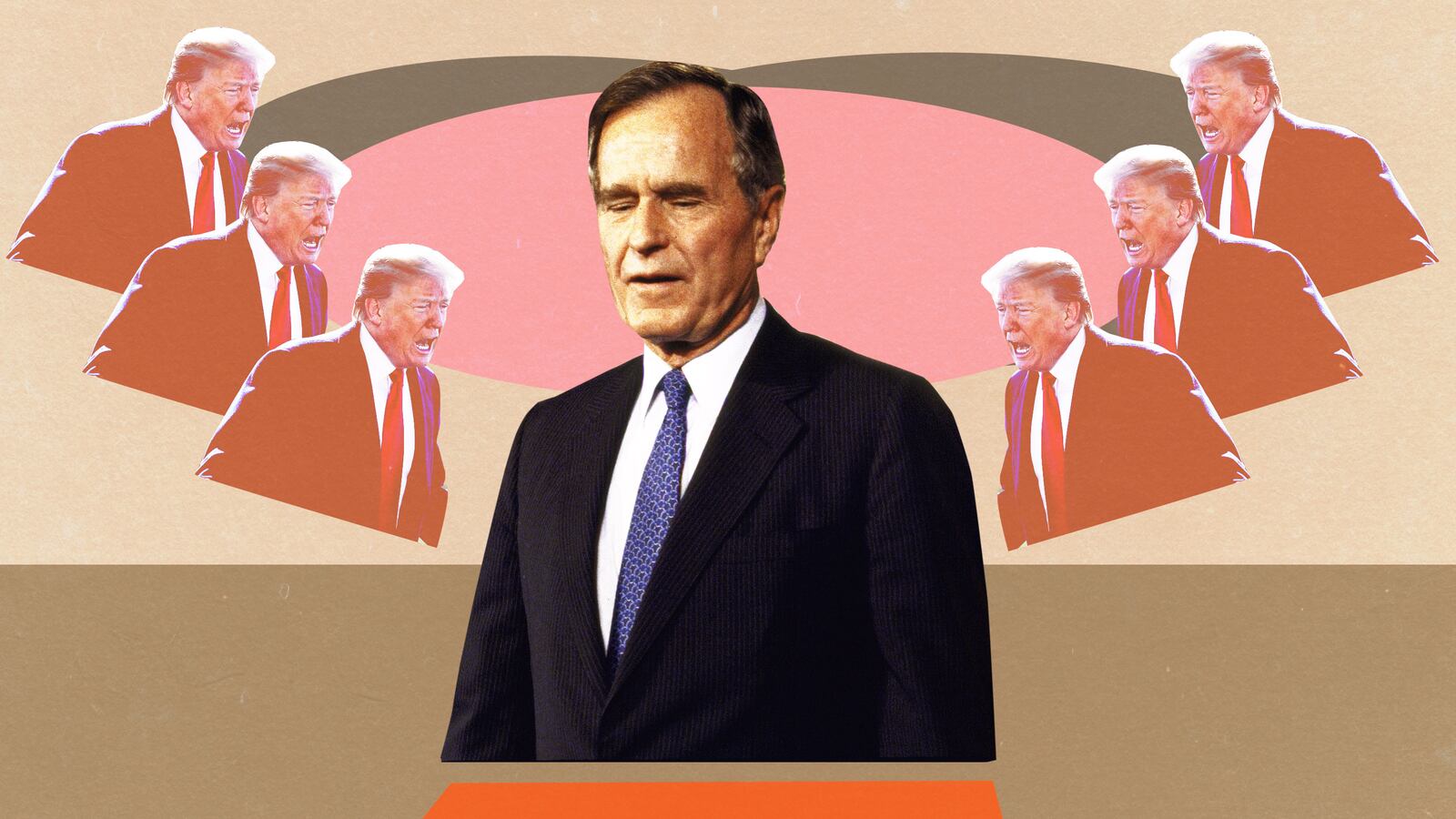The murder of George Floyd, the ensuing protests, and resultant violence should provide little comfort to Donald Trump, much as he relishes the chaos. Four years ago, Trump positioned himself as the “law and order” candidate against Hillary Clinton. Now that gambit may come to haunt him.
The world makes for a poor scapegoat for a sitting president’s own failures, and the veterans of George H.W. Bush’s re-election campaign can tell you, because we actually have seen this movie before: Los Angeles’ April 1992 riots happened on our boss’ watch, and the 41st president’s candidacy never recovered.
On Election Day 1992, the public gave Bush the pink slip after a single term in office. Indeed, Bush suffered an even worse drubbing at the polls than a beleaguered Jimmy Carter 12 years earlier. Back then, Carter still managed to muster more than two in five voters against Ronald Reagan in a three-way race, even as he got the boot after only four years on the job and 52 Americans hostages languished in Iran.
In the end, the voters held Bush accountable for the nation’s ills and his presidency’s missteps. America’s 1991 Gulf War triumph yielded to the realities of a recession and urban unrest. To be clear, from where we sat, the story wasn’t supposed to end that way, but it did.
Let’s take a trip down memory lane. In 1988, the Bush campaign was all about law and order. More important, it worked.
Bush was down 17 points on Memorial Day, plenty of time. Five months later, Reagan’s vice president came roaring back to defeat a hapless Mike Dukakis, Massachusetts’ bloodless technocrat governor.
Gazing into history’s rearview mirror, it seemed easy, even if the optics were disconcerting. The campaign hammered away on Dukakis’ weekend furloughs for convicted felons and his membership in the American Civil Liberties Union.
As a finishing touch, Bush ’88 deployed attack ads showing Dukakis looking like Snoopy in a military tank. On Jan. 20, 1989, Bush took the oath of office after garnering more than 400 votes in the Electoral College, a feat never since repeated.
Things, however, did not stand still. “Poppy” broke his famed “no new taxes” pledge after less than two years in office. As a result, he forfeited the loyalty of the party’s base and earned a primary challenge from Pat Buchanan, Richard Nixon’s speechwriter and paleoconservative icon.
To make matters worse, by early 1992, the unemployment rate had hit 7.5 percent. The glory of Gulf War victory had yielded to the reality of economic downturn.
Bush also suffered from other woes. Immediately after the war’s end, in early March 1991, members of the Los Angeles Police Department mercilessly beat Rodney King as he attempted to avoid arrest. Unfortunately for Bush and the LAPD, the act of police brutality was captured on film and became a nightly news staple, a precursor of sorts to the recent killing of George Floyd in Minneapolis.
Still, those were heady days. Bush’s approval stood north of 70 percent, and the nascent campaign was gearing up to run on the “Three Ks”—crime, quotas and Kuwait, melding domestic conservatism to military success. Unfortunately, it didn’t last.
The economy went into retrograde and the president’s record on crime continued to dull. In April 1992, amid the GOP primaries, a Los Angeles jury acquitted four police officers of using excess force against King. Rioting ensued. Like Kevin Bacon yammering “all is well” in Animal House, the administration looked helpless. When you sit in the Oval Office you are not a spectator.
Then as now, Bill Barr was attorney general and he failed to reassure. Questioned at the time about the LA riots, Barr intoned that “our system is fair and does not treat people differently,” conceding that “our national criminal-justice system is a diverse broad one, and incorporates state systems and county systems.”
By June 1992, Ross Perot led Bush and Clinton, then Arkansas governor, in the polls. Gulf War triumph couldn’t save Bush from an endless news loop of urban unrest, billowing smoke, blaring sirens and broken windows cast against the backdrop of a recession. In November, Clinton emerged victorious and Bush garnered less than 38 percent of the vote, a showing worse than Carter’s in 1980.
Fast-forward, Trump has failed to deliver a key campaign promise of keeping us safe. To paraphrase his acceptance speech at the 2016 Republican convention in Cleveland, “the crime and violence” that “afflicts our nation” has not “come to an end.” Nor for that matter has safety been “restored.” Far from it. Rather, American carnage aptly describes our mordant reality.
These days, approximately 105,000 Americans lie dead as the result of a pandemic, and more than 40 million are out of work. The wounds that pock our nation deepen as our cold civil war grows hotter by the day.
Candidate Trump once told the GOP, “The most basic duty of government is to defend the lives of its own citizens” and that “any government that fails to do so is a government unworthy to lead.” Talk about mission failure.
For almost a year, the president has consistently trailed Joe Biden. The electorate’s verdict is just five months away.






